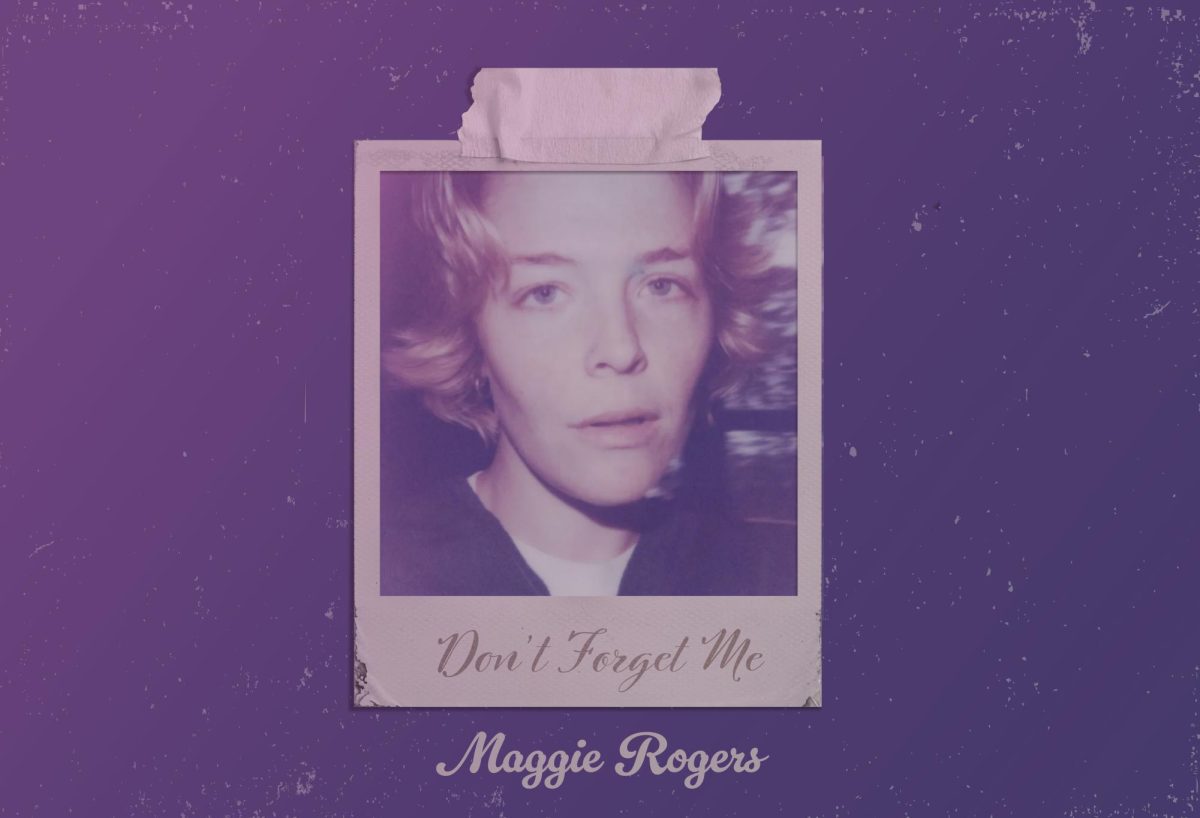When Maggie Rogers released “Don’t Forget Me,” it truly made it impossible for us to forget her.
Rogers, known for her powerful singing and lyrics, has released a new album that will drive listeners right back to her. Her album, “Don’t Forget Me,” was released on Apr. 12, 2024, and has since aged in the same way all of Rogers’ songs have—beautifully.
Most famously known for her song “Alaska” which gained widespread traction, since then Rogers continues to create captivating music.
But does this album meet the high expectations that previous albums “Surrender” and “Echo” set?
Going into this album, a few songs caught me off guard as they were able to showcase Rogers as the dedicated artist she is.
Starting with her leadoff track “It Was Coming Along,” which describes how life changes and how we are supposed to learn to change with it. On this track, she emphasizes how much her life has changed, and the album only evolves with it.
I think this is the perfect song to begin the album, as it sets us up for the first stage of life she intends to explain.
The album in itself is about reflection of life as well as love and grief. To start the album with a song that emphasizes the stages of grief when tackling life, it shows the impact Rogers wants to leave with this record–relatability and vulnerability.
“Drunk,” her next song in the album, comes to you in a whirlwind. The song gives a much more alternative rock sound that I am less familiar with, specifically when it comes to Maggie Rogers’ discography. However, I love the turn she takes into a new genre.
The song brings this idea of growth into a serious moment in adulthood.
“Lost in wishful thinkin’, ’round and ’round and ’round it goes/I can hear them whisperin’/Call, but I’m not listenin’.” Rogers shows us the highs and lows of thinking about her past, specifically as an adolescent.
She takes us on this dizzy feeling of constantly thinking about her past life using the repetition of her chorus. Rogers uses real-life concepts in her songs quite often, and I feel like they aren’t talked about enough. She has a lot of powerful vocals that are underappreciated in the industry.
However, I do think the repetitiveness on the track becomes a bit uninteresting. I would’ve hoped for this song to have a bit more lyrically to give the song less of a bland feeling. Regardless, I do think the song works well in the album’s progression.
“So Sick Of Dreaming” is a track I truly believe Rogers finds her niche in. The “folk-esque” vibe specifically in the line in backtrack instrumentals. This makes me intrigued by what Rogers could potentially create in the future.
“I wanted to make an album to belt at full volume alone in your car, a trusted friend who could ride shotgun and be there when you needed her,” Maggie Rogers said to Billboard.
This song gives exactly the energy she was looking for. I’m never surprised by Rogers’ ability to make a scene appear through lyrics, but this song took me off guard as it is a sound I am not used to hearing from her.
Not only with “So Sick of Dreaming,” but her next track, “The Kill,” reminds me exactly of the tunnel scene in “The Perks of Being a Wallflower.” Rogers amps up the chorus of this song in a breathtaking way, creating a “main character” moment for her listeners.
As the album continues, we get power ballads such as “I Still Do” bringing us back to that emotionally raw Rogers lyricism I remember from her much older EPs. Rogers can capture this with only a piano instrumental, making the listener feel more connected to the artist.
Even with the growth she has had as an artist, I still see a lot of the old elements she had in her previous music. Some elements she uses are combining different genres in songs to create experimental pieces.
Rogers continues to produce consistently powerful songs throughout this album including “Never Going Home.”
This song describes the feeling of still being hung up on a past love, yet, having enough self-respect for yourself to not go back. This emotional toggle is done so wistfully that it draws the listener in yet again to another song.
“I can’t behave, but I don’t want to be alone/But you kept me waiting, now I’m never, ever going home/Never going home,” Rogers writes in this song to capture that feeling.
Lines like these make me realize how powerful Rogers’ music can be and how deserving she is to come up in the industry.
Finally, Rogers ends the album with the title track, an interesting choice of placement that I have yet to see many artists do. Regardless, I think it is a phenomenal way to end such a passionate album.
The song is so focused on the idea of reclaiming acceptance, similar to the stages of grief. Rogers can end the album on a note of closure exactly how the process of healing is intended.
This song describes the desire to have love and security while also acknowledging feeling unready to settle. Rogers describes the feeling of being in two different stages of life from the people you are surrounded by.
Rogers was able to present such a vulnerable experience so comfortingly. Through lines such as, “Oh and promise me that when it’s time to leave don’t forget me,” Rogers encapsulates the tethered moment from what the heart desires and what will inevitably happen– change.
As I dive into more of Maggie Rogers’ work, I applaud her. Her voice in the music industry is becoming much more clear in her recent work. She has now found that voice in herself that she has been searching for since 2016.
“Now my life is a lot more balanced and a lot more full – and I’m not saying by any means I have figured it out,” Maggie Rogers said on Apple Music.
The ability to share such vulnerable moments has always drawn me to Rogers, and this album has proven why time and time again Rogers deserves more recognition for her artistry. Teasing her next tour with this album, I cannot wait to see where Rogers takes her musical profession.

































































































































































